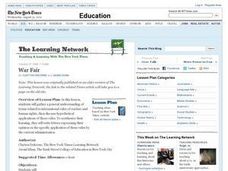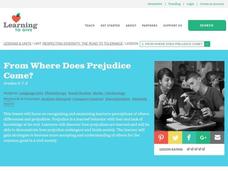Annenberg Foundation
America's History in the Making: Using Digital Technologies
How can digital technology of today link us to the events of the past? Scholars use technology to uncover the vast number of historical resources available in lesson 12 of a 22-part America's History in the Making series. Using databases...
Reed Novel Studies
Ophelia and the Marvelous Boy: Novel Study
What do wizards smell like? A novel study for Ophelia and the Marvelous Boy walks readers through chapter one to help them answer the question. Scholars also practice vocabulary from the chapter and invent original similes.
Reed Novel Studies
The Outsiders: Novel Study
The greasers and Socs, both gangs in S.E. Hinton's The Outsiders, came from opposite sides of the tracks, yet seemed to live in two different worlds. Scholars answer comprehension questions, create alliterations, and work with vocabulary...
Joel Michel Studies
The Swiss Family Robinson: Novel Study
What items would most people want to have with them if they were stranded on a desert island? Using the novel study for The Swiss Family Robinson, scholars attempt to answer the question from their own perspectives. They also explore...
Cold Spring Harbor Laboratory
Mendelian Genetics Cannot Fully Explain Human Health and Behavior
The breakthrough of Mendelian genetics solved many puzzles for biologists. Then, scientists decided to apply the theory to human behavior. Learn the story and struggle of finding a genetic explanation for hobbies, interests, and mental...
Reed Novel Studies
The War That Saved My Life: Novel Study
Most people think of war when they think of casualities. However, Ada used war to regain her life. A ten-year-old girl in The War That Saved My Life is a prisoner in her own home. However. when her brother goes to war, she takes the...
EngageNY
Annotating the Text and Identifying Argument, Claims, and Evidence: “Double Whammy” Excerpt from “The Exterminator"
That's a double whammy! Scholars read the excerpt Double Whammy from The Exterminator. After identifying the gist of the text, they annotate by marking the author's claim. The group discusses what is meant by double whammy and complete...
Curated OER
Law of the Sea/ Don't Rock the Boat
Students read Ronald Reagan's December 27, 1988 proclamation about US territorial waters. They discuss its contents to decipher exactly what it means and to complete a worksheet answering questions about the proclamation.
Curated OER
American Justice: The Texas Cheerleader Plot
Students watch a video about one woman who planned to commit murder because of a cheerleading scandal.
Curated OER
What is all the Fuss about?
Students brainstorm a list of science discoveries and inventions that they think are important. They work in small groups, students examine 1-3 science discoeries more closely. Each group needs a recorder, and they answer three...
Curated OER
Civil Rights through Photographs
Students examine why racial tensions continued after laws were put into place to try and create equal treatment. In this two part Civil Rights lesson, students explored the causes of the movement through photography and a PowerPoint...
Curated OER
War Fair
Students gather a general understanding of terms related to international rules of warfare and human rights, then discuss hypothetical applications of those rules. They write letters expressing their opinion on the current application of...
Curated OER
The Energy of Light
Students discuss different ways engineers use light. In this engineering lesson, students are introduced to the properties of light and the way light is used. They view a demonstration of light waves using a slinky, and practice using...
Curated OER
Discovering a Law of Space Physics
Learners use data collected by an astronomer to determine the relationship between the time it takes the planet to orbit the sun and the average radius of the planet's orbit around the sun. Students use trial and error to find the...
Curated OER
Water Rights
Students discuss resource availability and natural resources. They explore the basic rules of appropriation. Students participate in a water rights simulation. They discuss possible consequences of appropriative water law.
Curated OER
Understanding the Significance of the Nationalization of the Bill of Rights
Eleventh graders study the impact of the Nationalization of the Bill of Rights upon criminal law. They analyze opposition to expansionist viewpoints that could possibly create more checks and balances on the state courts and analyze...
Curated OER
Transformations: Dilating Functions
Young scholars dilate functions using transformation. For this algebra lesson, students complete vertical dilation, stretch and shrink. They perform reflection across the x and y axis.
Curated OER
Frozen Film
Students discover how light reflects off surfaces. In this hands-on demonstration, students examine how variations in color are produced by light interference.
Curated OER
Rescuers: Those Who Risked Their Lives to Save Others
Learners examine stories of Holocaust heroes. In this Holocaust lesson, students study the contributions of those who saved Jewish prisoners. Learners compose reflective essays pertaining to the topic.
Curated OER
Reading Fluency Poetry Reading
Fifth graders observe video of poem recitations of a person reciting a poem. In this language arts lesson, 5th graders discuss rhythm and rhyme of poetry as well as pauses within poems. Students choose a poem, in a small group, and...
Curated OER
Pardon Me, Please
Students research capital punishment policies supported by leaders who have issued pardons, then reflect on how executive pardons might affect the balance of power between the branches of government.
Curated OER
Bill of Rights
Students research, list, define and discuss all the aspects to the United States Bill of Rights. They assess their foundations by James Madison and Thomas Jefferson and reflect on all the conditions happening at the time period of...
Curated OER
The Counter Reformation
In this Counter Reformation study guide worksheet, students read a brief overview pertaining to the time period in world history and then respond to 3 reflection questions.
Curated OER
From Where Does Prejudice Come?
Students explore the concept of discrimination. In this social studies instructional activity, students view pictures and write down the first thing that comes to their mind. Students discuss if stereotyping or prejudice affected their...






















